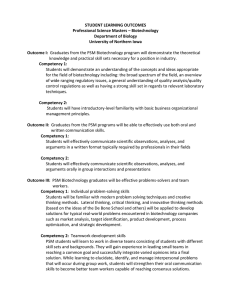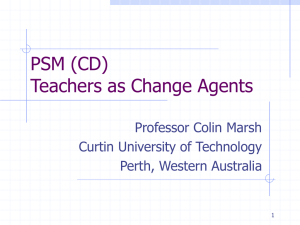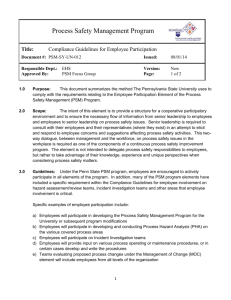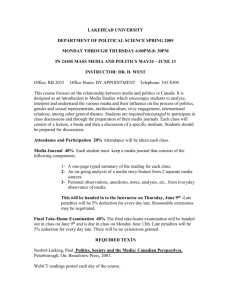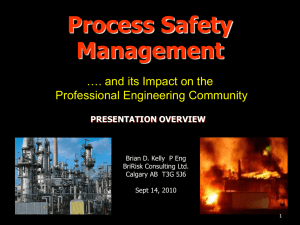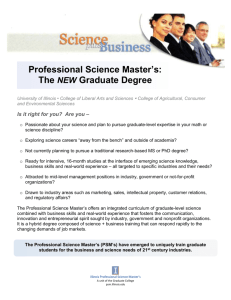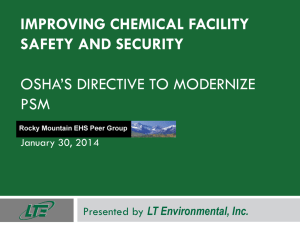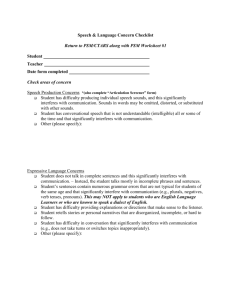STUDENT OUTCOMES ASSESSMENT PLAN Professional Science Masters – Biotechnology Department of Biology
advertisement
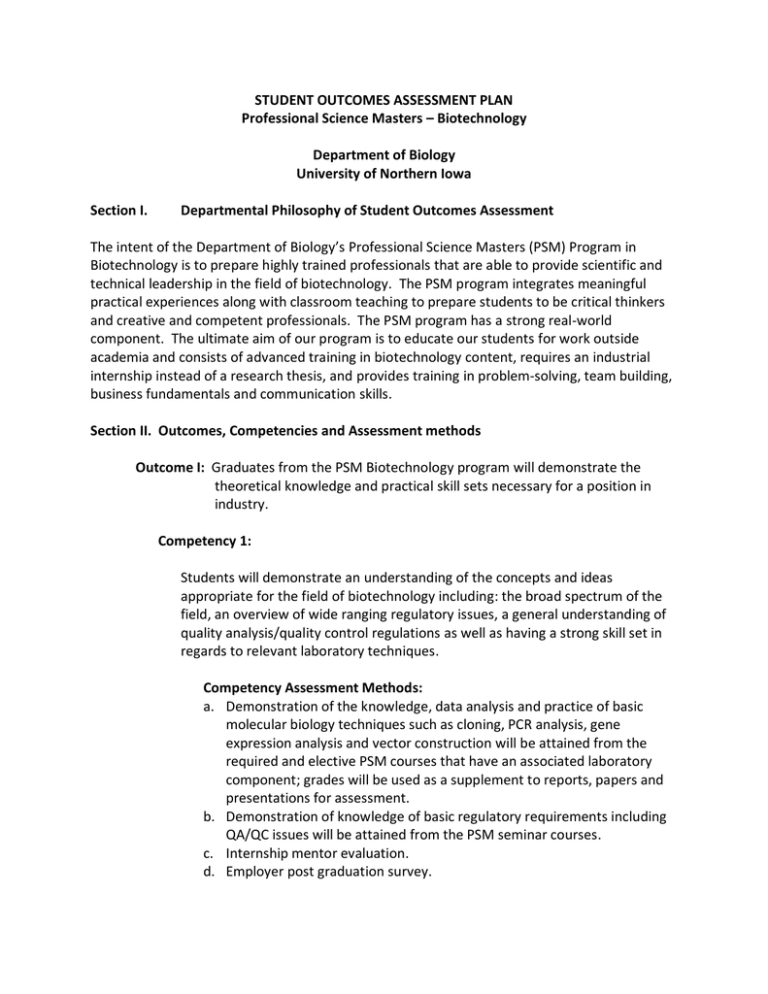
STUDENT OUTCOMES ASSESSMENT PLAN Professional Science Masters – Biotechnology Department of Biology University of Northern Iowa Section I. Departmental Philosophy of Student Outcomes Assessment The intent of the Department of Biology’s Professional Science Masters (PSM) Program in Biotechnology is to prepare highly trained professionals that are able to provide scientific and technical leadership in the field of biotechnology. The PSM program integrates meaningful practical experiences along with classroom teaching to prepare students to be critical thinkers and creative and competent professionals. The PSM program has a strong real-world component. The ultimate aim of our program is to educate our students for work outside academia and consists of advanced training in biotechnology content, requires an industrial internship instead of a research thesis, and provides training in problem-solving, team building, business fundamentals and communication skills. Section II. Outcomes, Competencies and Assessment methods Outcome I: Graduates from the PSM Biotechnology program will demonstrate the theoretical knowledge and practical skill sets necessary for a position in industry. Competency 1: Students will demonstrate an understanding of the concepts and ideas appropriate for the field of biotechnology including: the broad spectrum of the field, an overview of wide ranging regulatory issues, a general understanding of quality analysis/quality control regulations as well as having a strong skill set in regards to relevant laboratory techniques. Competency Assessment Methods: a. Demonstration of the knowledge, data analysis and practice of basic molecular biology techniques such as cloning, PCR analysis, gene expression analysis and vector construction will be attained from the required and elective PSM courses that have an associated laboratory component; grades will be used as a supplement to reports, papers and presentations for assessment. b. Demonstration of knowledge of basic regulatory requirements including QA/QC issues will be attained from the PSM seminar courses. c. Internship mentor evaluation. d. Employer post graduation survey. Competency 2: Students will have introductory-level familiarity with basic business organizational management principles. Competency Assessment Methods: a. Term paper as well as oral presentations in the Business Management for Science Professionals course will demonstrate an understanding of a key business principle with regard to a specific example of biotechnology. b. Internship mentor evaluation. c. Employer post graduation survey. Outcome II: Graduates from the PSM programs will be able to effectively use both oral and written communication skills. Competency 3: Students will effectively communicate scientific observations, analyses, and arguments in a written format typically required by professionals in their fields Competency assessment methods: a. Scientific writing samples from each required PSM course (Advanced Analytical Techniques, Advanced Cellular and Molecular Biology, Team Project Problem Solving, PSM Seminar, PSM Internship) will be maintained by the student in a Work portfolio at the start of their program. b. Internship mentor evaluation. c. Alumni survey. d. Employer post graduation survey. Competency 4: Students will effectively communicate scientific observations, analyses, and arguments orally in group interactions and presentations Competency Assessment methods: a. Presentations in several of the required PSM courses (Team-Problem Solving, Advanced Cellular and Molecular Biology, Advanced Analytical Techniques and PSM Seminar). Hard copies of these presentations will be included in the student Work portfolio. b. Alumni post graduation survey. c. Employer post graduation survey. Outcome III: PSM Biotechnology graduates will be effective problems-solvers and team workers. Competency 5: Individual problem-solving skills Students will be familiar with modern problem solving techniques and creative thinking methods. Lateral thinking, critical thinking, and innovative thinking methods (based on the ideas of the De Bono School and others) will be applied to develop solutions for typical real-world problems encountered in biotechnology companies such as market analysis, target identification, product development, process optimization, and strategic development. Competency Assessment Methods: a. Frequent discussions will be used to develop and cultivate each student’s critical thinking capabilities. Written evaluation reports for each student, provided by the instructor, will reflect on the development of such skills and added to the student’s portfolio. b. Advancements made in developing critical thinking and problem-solving skills will be assessed from materials generated by the student. Examples of flow-charts, concept maps, mind maps, as well as other written documentation generated during relevant course work will be added to the student’s portfolio. Competency 6: Teamwork development skills PSM students will learn to work in diverse teams consisting of students with different skill sets and backgrounds. They will gain experience in leading small teams in reaching a common goal and successfully integrate varied opinions into a final solution. While learning to elucidate, identify, and manage interpersonal problems that will occur during group work, students will strengthen their oral communication skills to become better team workers capable of reaching consensus solutions. Competency Assessment Methods: a. The outcomes of weekly team meetings will be reflected by oral presentations and written communications given by the students. Examples of such reflections will be added to the student’s portfolio. b. Personal self-reflection essays will be collected from each student at the beginning of the project, in the middle, and at the end of the second semester and added to the student’s portfolio. c. Student teams will write formal summary reports about their work by the end of the term and add those reports to their portfolio. Section III. Analysis-Interpretation and Reporting of Results At the start of the PSM program each student will be responsible for maintaining a Work Portfolio of their academic progress. This portfolio will include a representative sample of the student’s work from the required PSM courses including: Advanced Analytical Techniques, Advanced Cell and Molecular Biology, Team Project Problem Solving, Business Management for Science Professionals, PSM Seminar and PSM Internship. The portfolio will be used by the PSM Biotechnology committee to evaluate the student’s progress towards the completion of their program after the Fall and Spring semester. After graduation of the student, portfolios will be maintained by the PSM Biotechnology coordinator. Program assessments will be performed every two years where the PSM Biotechnology coordinator meets with members of the department’s Outcomes Assessment Committee to determine if PSM Biotechnology students are meeting the outcomes and competencies outlined in the Outcomes Assessment plan. They may also evaluate feedback from alumni and industry about the program's adequacy in preparing the students for industry careers. All potential program modifications will be reviewed by the PSM Biotechnology committee and any changes will be forwarded to the Graduate Committee for review and ultimately passed on to the departmental Curriculum Committee. Findings that exemplify the program goals will be shared with the national PSM initiative and will be used in marketing the program to students and to potential internship providers. Negative findings will be used to drive curriculum/program revisions.
